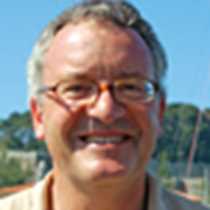St Jean de Luz
”Four plus three equals one,” runs the old Basque slogan: for the Basque country finds itself historically divided between two nation-states, with four of its provinces in Spain and three on this side of the Pyrennees in France. During the war years, the town was a center of resistance to Fascism both in Franco's Spain and in Occupied France. In 1937, the Basques had the dubious privilege of being the first people to experience blitzkrieg, when General Franco invited Hitler's Luftwaffe to bomb the Basque holy city of Guernica. The event was commemorated on canvas by Pablo Picasso in one of art history's greatest anti-war statements; he refused to allow his tormented painting, drained of all living color, to be displayed in Spain until after Franco's death. Now the Basques are campaigning to have it hung in the Guggenheim in the Basque city of Bilbao.
The Basques are a tenacious people. Their language has been spoken in this corner of Europe for thousands of years and neither Fascist Spain nor Jacobin France managed to see it off, although even to speak the language in public was to court danger from the authorities. The language is unrelated to any of the Indo-European family of languages and may be the aboriginal language of Palaeolithic Europe before the migrations of the Indo-Europeans some 5000 years ago. Thanks to the human rights legislation that is the at the heart of the European Union, Basque speakers now enjoy civil rights on either side of the Pyrennees even if their dream of a united homeland remains elusive.
National pride is reflected in the red, green and white evident everywhere from fishing boats to shuttered houses. St Jean de Luz is a delightful fishing port and beach resort, a perfect combination for restaurants to flourish that specialize in Basque cuisine, fish with plenty of paprika and espelette chili peppers as an entrée followed by chocolate desserts. Indeed the chocolate is sometimes flavored with chili peppers, as originally favored by the Aztecs, a reminder that it was in the Basque country that these exotic new World products made first landfall in Europe. For the Basques are far from introspective, their fishermen and whalers have for centuries been familiar with the world's oceans. That said, there are few more home-loving peoples in Europe than the Basques, indeed they introduce each other not by their family names but by the names of their houses. As a twentieth-century Basque poet expressed it: "the house of my father will endure."
”Four plus three equals one,” runs the old Basque slogan: for the Basque country finds itself historically divided between two nation-states, with four of its provinces in Spain and three on this side of the Pyrennees in France. During the war years, the town was a center of resistance to Fascism both in Franco's Spain and in Occupied France. In 1937, the Basques had the dubious privilege of being the first people to experience blitzkrieg, when General Franco invited Hitler's Luftwaffe to bomb the Basque holy city of Guernica. The event was commemorated on canvas by Pablo Picasso in one of art history's greatest anti-war statements; he refused to allow his tormented painting, drained of all living color, to be displayed in Spain until after Franco's death. Now the Basques are campaigning to have it hung in the Guggenheim in the Basque city of Bilbao.
The Basques are a tenacious people. Their language has been spoken in this corner of Europe for thousands of years and neither Fascist Spain nor Jacobin France managed to see it off, although even to speak the language in public was to court danger from the authorities. The language is unrelated to any of the Indo-European family of languages and may be the aboriginal language of Palaeolithic Europe before the migrations of the Indo-Europeans some 5000 years ago. Thanks to the human rights legislation that is the at the heart of the European Union, Basque speakers now enjoy civil rights on either side of the Pyrennees even if their dream of a united homeland remains elusive.
National pride is reflected in the red, green and white evident everywhere from fishing boats to shuttered houses. St Jean de Luz is a delightful fishing port and beach resort, a perfect combination for restaurants to flourish that specialize in Basque cuisine, fish with plenty of paprika and espelette chili peppers as an entrée followed by chocolate desserts. Indeed the chocolate is sometimes flavored with chili peppers, as originally favored by the Aztecs, a reminder that it was in the Basque country that these exotic new World products made first landfall in Europe. For the Basques are far from introspective, their fishermen and whalers have for centuries been familiar with the world's oceans. That said, there are few more home-loving peoples in Europe than the Basques, indeed they introduce each other not by their family names but by the names of their houses. As a twentieth-century Basque poet expressed it: "the house of my father will endure."




